
-
Find the right food for your petTake this quiz to see which food may be the best for your furry friend.Find the right food for your petTake this quiz to see which food may be the best for your furry friend.Featured products
 Perfect Weight Small & Mini Adult Dog Food
Perfect Weight Small & Mini Adult Dog FoodHill's Science Plan Adult Small & Mini Dog Food with Turkey is a complete premium pet food for adult small dogs from 1 year old that are prone to weight gain or slightly overweight. This deliciously smooth mousse is formulated to deliver the appropriate amount of energy to support weight maintenance in adult dogs.
Shop Now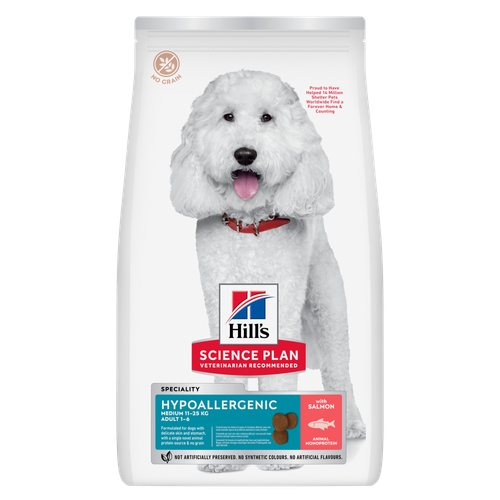 Hypoallergenic Medium Adult Dog Food
Hypoallergenic Medium Adult Dog FoodScience Plan Hypoallergenic Medium Adult dog food with Salmon is a gentle, science-led formula crafted for dogs with food sensitivities. Made with carefully selected, high-quality novel proteins and no grains, it’s tailored to minimise common triggers that can lead to skin and digestive discomfort.
Shop Now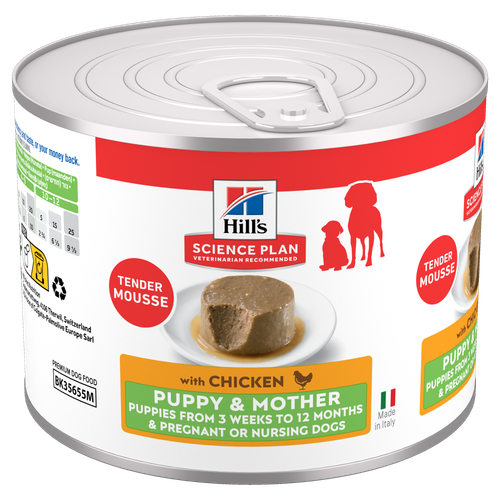 Puppy & Mother Tender Mousse Dog Food
Puppy & Mother Tender Mousse Dog FoodHill's Science Plan Puppy & Mother Tender Mousse Dog Food with Chicken is a complete premium pet food for puppies and pregnant or nursing dogs. Formulated with chicken and other specially selected ingredients, including minerals and antioxidants to support gut health and optimal growth, it comes in a soft mousse texture they'll love.
Shop NowFeatured products Hypoallergenic Dry Cat Food
Hypoallergenic Dry Cat FoodHILL'S SCIENCE PLAN Hypoallergenic Adult cat food with egg & insect protein is a complete pet food for adult cat 1–6 years old. It's formulated for cats with delicate skin and stomach, with limited high quality novel protein sources & no grain.
Shop Now Oral Care Adult Cat Food
Oral Care Adult Cat FoodHill's Science Plan Oral Care Adult Cat Food with Chicken contains clinically proven kibble technology to reduce plaque & tartar build up.
Shop Now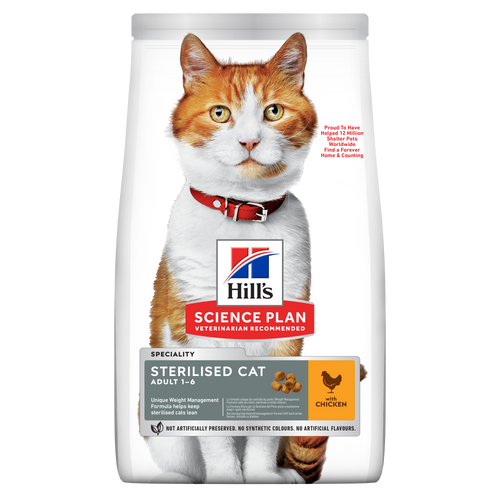 Sterilised Adult Cat Food
Sterilised Adult Cat FoodHill's Science Plan Adult Sterilised Cat Dry Food with Chicken is specially formulated with ActivBiome+ Multi-Benefit Technology. It is a precisely balanced nutrition, tailored to meet the needs of sterilised cats, to help keep sthem lean & healthy.
Shop Now -
Dog
- Dog Tips & Articles
-
Health Category
- Weight
- Food & Environmental Sensitivities
- Urinary
- Digestive
- Joint
- Kidney
-
Life Stage
- Puppy Nutrition
- Adult Nutrition
- Senior Nutrition
Cat- Cat Tips & Articles
-
Health Category
- Weight
- Skin & Food Sensitivities
- Urinary
- Digestive
- Kidney
-
Life Stage
- Kitten Nutrition
- Adult Nutrition
Featured articles What Cleaning Products Are Safe for Pets?
What Cleaning Products Are Safe for Pets?Learn which cleaning product ingredients can be hazardous for dogs & cats, which alternatives are safer and tips for using cleaning products around pets.
Read MoreTips for Working From Home With a PetGet helpful information on how to get all of your work done while keeping your dog or cat entertained when working from home.
Read More Tips For Mixing Wet And Dry Pet Food
Tips For Mixing Wet And Dry Pet FoodDiscover tips for mixing wet and dry pet food to ensure balanced nutrition and variety for your pet. For comprehensive feeding advice, visit Hill's Pet UK.
Read More -


Some dog parents confuse arthritis with hip dysplasia but, unlike arthritis, hip dysplasia in dogs develops when a dog is young. Read on to learn everything you need to know about this condition.
What Is Hip Dysplasia in Dogs?
Canine hip dysplasia arises during a dog's juvenile growth phase and results from a malformed hip joint. According to the Cornell University College of Veterinary Medicine, hip dysplasia is the most common orthopaedic condition in medium and large breed dogs, with an incidence rate of more than 70 percent in some pure breeds.
In dogs with canine hip dysplasia, parts of the hip joint grow at different rates, leading to instability and looseness. This instability allows excess movement and abnormal bony rubbing, which causes pain and even small fractures.
Signs of Canine Hip Dysplasia
One of the first clues your dog may be suffering from hip dysplasia is if they're reluctant to rise from a sitting or lying position. This behaviour can be seen in puppies as young as a few months old but is most common in dogs less than 2 years old.
Lameness resulting from hip dysplasia in dogs is usually chronic and progresses slowly. Thus, lameness isn't always a primary sign of the condition. Instead, dogs may show signs of exercise intolerance or weakness. When your veterinarian examines your dog's hips, they'll watch for indicators of pain or resistance to pressure.
Your dog likely doesn't have hip dysplasia if their lameness begins suddenly or progresses rapidly, the lameness is severe, they can't move well on their rear legs or if they have an uncoordinated gait.


Tasty Tips
What Causes It?
The American College of Veterinary Surgeons explains that there are two primary causes of hip dysplasia in dogs: genetics and nutrition. While genetics determine whether a dog develops hip dysplasia, nutritional research shows that consuming food that's too high in calcium or calories also plays a role in the condition's development.
Although any dog can be affected, hip dysplasia is typically seen in larger dogs, such as German shepherds, Saint Bernards, mastiffs, rottweilers, Labrador retrievers, golden retrievers, Old English sheepdogs and bulldogs . Mixed-breed dogs are also at risk.
If you have a medium, large or giant breed puppy, you can reduce their risk of developing the condition by feeding them a balanced puppy food designed for large breeds. Also, help them to avoid rapid weight gain during their first year of life. Make sure to talk to your veterinarian about your dog's food, and have them recommend one that would be best for your dog's growth and development.
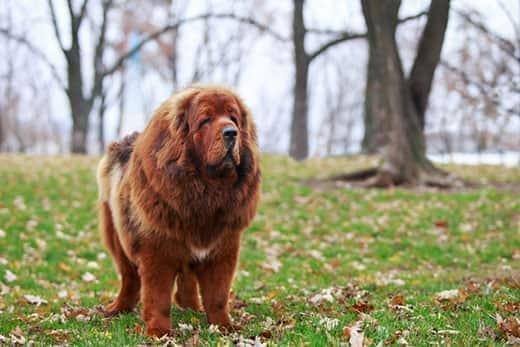
How Is It Diagnosed?
Your vet will likely screen for hip dysplasia during your dog's regular checkup. They do this by evaluating your dog's gait and examining their body for signs of pain.
Because the condition can cause hip muscles to atrophy, your vet may X-ray the area, if suspected.
What Treatments Are Available?
Minimally affected dogs may benefit from nonsteroidal anti-inflammatory drugs. Most vets also recommend over-the-counter joint supplements containing glucosamine and chondroitin sulphate. Be sure to ask your veterinarian about dog foods that are specially formulated for mobility health that contain many of the same joint health nutrients that these supplements contain.
If your dog is overweight, you'll want to make a weight-loss plan right away, as reducing the weight-bearing load and friction upon the joints will likely improve your dog's mobility and comfort. Your veterinarian can help determine the best method, including a proper nutrition plan (including potentially switching to a dog food formulated for getting your dog to the proper weight) and exercise as long as your dog can tolerate it with the stress on their hips.
If your dog is severely affected, surgery may be the best option. Several surgical procedures are available to treat canine hip dysplasia, with the most common being total hip replacement and femoral head ostectomy. Your vet will work with you to choose the best procedure for your dog and may refer you to a board-certified veterinary surgeon.
There are also a plethora of new alternative therapies. Biologic therapeutics, such as platelet-rich plasma therapy and stem cell therapy, are now available in veterinary clinics across the nation. Many dog parents and vets alike find that such therapeutics provide temporary relief — albeit of varying degrees. Acupuncture and laser therapy are also popular adjunctive treatments. Your veterinarian will be to help you determine the best course of treatment for your dog's particular condition.
If you think your dog might be showing signs of hip dysplasia, talk to your vet today and have your pet diagnosed.


Dr. Laci Schaible is a small animal veterinarian, veterinary journalist, and a thought leader in the industry. She received her Doctor of Veterinary Medicine from Texas A&M University and her Masters in Legal Studies from Wake Forest University.
Related products

Science Plan Hypoallergenic Medium Adult dog food with Salmon is a gentle, science-led formula crafted for dogs with food sensitivities. Made with carefully selected, high-quality novel proteins and no grains, it’s tailored to minimise common triggers that can lead to skin and digestive discomfort.

Hill's Science Plan Puppy & Mother Tender Mousse Dog Food with Chicken is a complete premium pet food for puppies and pregnant or nursing dogs. Formulated with chicken and other specially selected ingredients, including minerals and antioxidants to support gut health and optimal growth, it comes in a soft mousse texture they'll love.
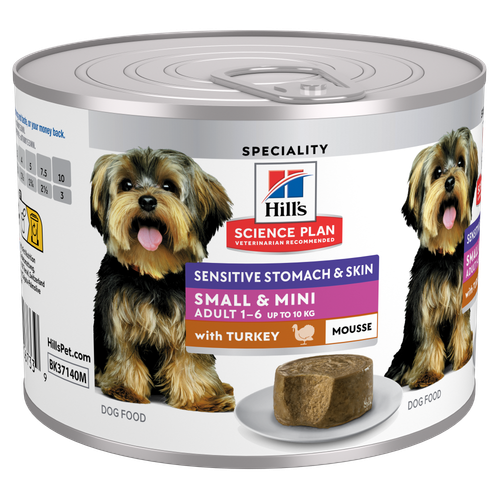
Hill's Science Plan Sensitive Stomach and Skin Small & Mini Adult Dog Food with Turkey is a complete premium pet food for small breed adult dogs aged 1–6 years. This deliciously soft mousse is enriched with ingredients that support digestive health & skin care.

Hill's Science Plan Adult Small & Mini Dog Food with Turkey is a complete premium pet food for adult small dogs from 1 year old that are prone to weight gain or slightly overweight. This deliciously smooth mousse is formulated to deliver the appropriate amount of energy to support weight maintenance in adult dogs.
Related articles

Puppy, kitten and pet dieting, cat nutrition and dog nutrition information from Hill's Pet

Discover the causes, signs, and treatments of kidney disease in dogs and find methods of supporting your dog's kidney health. Learn more at Hill's Pet South Africa.

Dog obesity is a significant problem - learn more about helping your dog become trimmer and healthier through improved nutrition.
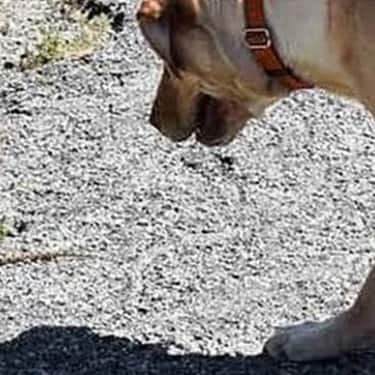
Learn about snake bites on dogs, including clinical symptoms to look for, what to do if you think your dog was bitten, and treatment & prevention options.

Put your dog on a diet without them knowing
Our low calorie formula helps you control your dog's weight. It's packed with high-quality protein for building lean muscles, and made with purposeful ingredients for a flavorful, nutritious meal. Clinically proven antioxidants, Vitamin C+E, help promote a healthy immune system.
Put your dog on a diet without them knowing
Our low calorie formula helps you control your dog's weight. It's packed with high-quality protein for building lean muscles, and made with purposeful ingredients for a flavorful, nutritious meal. Clinically proven antioxidants, Vitamin C+E, help promote a healthy immune system.

